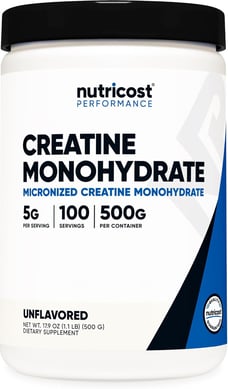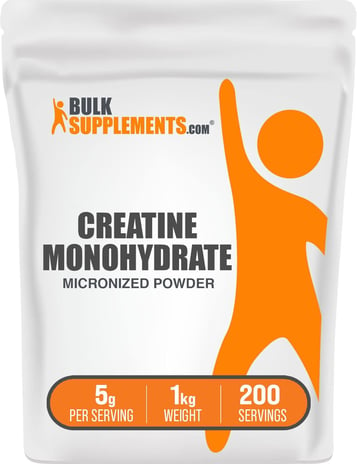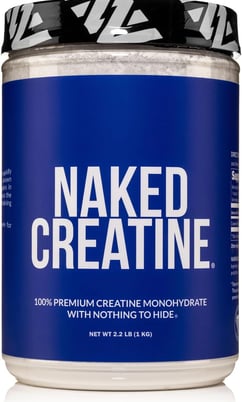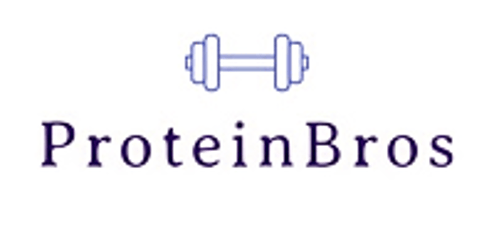Creatine 101: What It Is and How It Helps Your Workout - Essential Guide for Fitness Enthusiasts
Creatine has become a popular supplement among athletes and fitness enthusiasts. This naturally occurring compound is found in small amounts in foods like meat and fish. It plays a crucial role in energy production within muscle cells. Learn more here!
12/23/20246 min read

Creatine has become a popular supplement among athletes and fitness enthusiasts. This naturally occurring compound is found in small amounts in foods like meat and fish. It plays a crucial role in energy production within muscle cells.
Creatine supplementation can enhance athletic performance by increasing muscle strength and power output during high-intensity, short-duration exercises. Studies have shown that it may improve muscle mass gains when combined with resistance training. The supplement is generally considered safe for healthy adults when used as directed.
Many athletes incorporate creatine into their training regimens to maximize their workout results. While individual responses may vary, research suggests that creatine can be an effective tool for those looking to boost their physical performance and reach their fitness goals.
Understanding Creatine
Creatine is a naturally occurring compound that plays a crucial role in energy production within muscle cells. It has gained popularity as a supplement for enhancing athletic performance and muscle growth.
Definition and Types
Creatine is an amino acid derivative synthesized in the liver, kidneys, and pancreas. The most common form used in supplements is creatine monohydrate. Other types include creatine ethyl ester, creatine hydrochloride, and buffered creatine.
Creatine monohydrate is the most extensively studied and widely available form. It consists of a creatine molecule bound to a water molecule.
Creatine ethyl ester is marketed as having better absorption, but research has not consistently supported this claim.
Biological Role in Muscle
Creatine serves as a rapid energy source for muscle contractions. It combines with phosphate to form phosphocreatine, which helps regenerate adenosine triphosphate (ATP) - the primary energy currency of cells.
During high-intensity, short-duration activities like weightlifting or sprinting, phosphocreatine provides quick bursts of energy. This process allows muscles to maintain performance for longer periods.
Creatine supplementation can increase muscle stores of phosphocreatine. This enhanced energy reserve may lead to improved strength, power output, and muscle growth over time with consistent training.
Health and Performance Benefits
Creatine offers various benefits for both athletic performance and overall health. Research shows positive effects on muscle strength, power output, and cognitive function.
Enhancing Athletic Performance
Creatine supplementation increases muscle creatine stores, leading to improved high-intensity exercise performance. Studies demonstrate gains in strength, power, and muscle mass when combined with resistance training.
Athletes often experience enhanced sprint capabilities and reduced fatigue during repeated bouts of intense activity. Creatine can boost workout volume, allowing for more reps and sets during training sessions.
Improved recovery between workouts is another advantage, potentially leading to more frequent and productive training sessions.
Creatine and Cognitive Function
Creatine's benefits extend beyond physical performance to brain function. Research indicates potential improvements in memory and cognitive processing speed.
Some studies suggest creatine supplementation may enhance mental fatigue resistance during challenging cognitive tasks. This effect could be particularly beneficial for individuals with high cognitive demands or sleep deprivation.
Emerging evidence points to neuroprotective properties, with potential applications in managing neurological disorders. Further research is needed to fully understand creatine's role in brain health.
Long-term Health Effects
Regular creatine use appears safe for healthy individuals, with no significant adverse effects reported in long-term studies. Some research suggests potential benefits for bone health, particularly in older adults.
Creatine may help maintain muscle mass and strength during periods of inactivity or injury recovery. This effect could be valuable for preventing age-related muscle loss.
Preliminary studies indicate possible cardiovascular benefits, including improved cholesterol profiles and reduced homocysteine levels. However, more research is needed to confirm these findings.
Creatine's role in glucose metabolism suggests potential benefits for individuals with insulin resistance or type 2 diabetes, though further investigation is required.
Usage Guidelines
Proper creatine usage maximizes benefits while minimizing potential side effects. Following recommended dosages and timing protocols helps athletes and fitness enthusiasts get the most out of supplementation.
Dosage Recommendations
The standard creatine dosage is 3-5 grams per day for maintenance. This amount effectively saturates muscle stores for most individuals. Some people opt for a loading phase of 20 grams daily for 5-7 days to rapidly increase creatine levels.
Higher doses don't provide additional benefits and may cause digestive discomfort. Smaller individuals may only need 2-3 grams daily. Athletes engaged in intense training might benefit from slightly higher doses of 5-10 grams per day.
It's important to stay well-hydrated when taking creatine. Drinking plenty of water helps the body utilize creatine more effectively.
Timing and Cycling
Creatine can be taken any time of day, but many prefer taking it pre- or post-workout. Some evidence suggests post-workout consumption may be slightly more beneficial. Consistency is key - taking creatine daily helps maintain muscle saturation.
Creatine doesn't require cycling for most users. Long-term daily use is considered safe and effective. Some choose to cycle off periodically, but there's no strong scientific basis for this practice.
For those who do cycle, a common protocol is 8-12 weeks on, followed by 4 weeks off. This allows the body's natural creatine production to normalize.
Safety and Side Effects
Creatine is generally considered safe for most people when used as directed. Proper usage and high-quality supplements can help minimize potential risks.
Mitigating Potential Risks
Short-term side effects of creatine supplementation may include weight gain, bloating, and digestive discomfort. These effects are typically mild and temporary.
Staying well-hydrated can help reduce the likelihood of cramping or dehydration. Starting with a lower dose and gradually increasing intake can minimize gastrointestinal issues.
Individuals with pre-existing kidney or liver conditions should consult a healthcare professional before using creatine. Regular check-ups can monitor kidney function in long-term users.
Identifying High-Quality Supplements
Choosing reputable brands is crucial for safety and effectiveness. Look for products certified by third-party organizations like NSF International or Informed-Choice.
Check labels for purity and avoid supplements with unnecessary additives or fillers. Creatine monohydrate is the most researched and recommended form.
Store creatine in a cool, dry place to maintain its quality. Avoid expired products or those with signs of moisture contamination.
Proper dosing is essential. Follow manufacturer guidelines or consult a healthcare professional for personalized advice
Below we have picked out our favorite creatine supplements from the best brands.
1. Nutricost Creatine Monohydrate Micronized Powder.
High Quality Micronized Creatine Monohydrate
Get The Strength and Endurance You've Been Working For
500 Grams of Creatine Monohydrate Per Bottle
5 Grams Per Serving (Scoop Included)
Our Creatine Monohydrate provides you with an ultra premium quality product. Our customers love this pre and post-workout supplement as much as we do.
2. BulkSupplements.com Creatine Monohydrate Powder - Creatine Supplement, Micronized Creatine 1kg, Creatine Powder - Unflavored & Gluten Free
Maximize your Potential: Enhance your active lifestyle with our Creatine Monohydrate powder, in Micronized Creatine powder, designed to support your strength and performance goals. Each serving delivers a substantial 5 grams dose, catering to both fitness enthusiasts looking to push their limits.
Versatility for all Lifestyles: Whether you're an athlete, a sprinter, or someone simply looking to stay active, our Pure Creatine powder, in Creatine 5g, fits seamlessly into your regimen, adaptable to a wide range of dietary needs and preferences.
Optimized in every Serving: Our Micronized Creatine Monohydrate powder, in Creatine 5000mg, is unflavored and free of unnecessary allergens, offering you a high-quality product that easily integrates with other supplements or your preferred shake or beverage.
Transparent and Trustworthy: Experience the confidence that comes with choosing a supplement that not only meets rigorous third-party testing but also upholds the principles of clarity and integrity in its formulation and production.
Commitment to Excellence: Produced in a facility compliant with strict cGMP standards, our Creatine supplement, in Creatine 5g powder or Creatine 5000mg powder, stands as a testament to our dedication to quality. You can trust in our product's consistency and excellence, batch after batch.
3. Naked CREATINE
ONLY ONE INGREDIENT: 100% Pure Micronized Creatine Monohydrate. Certified Vegan, Non-GMO, Soy Free and Gluten Free.
HIGHEST QUALITY: Naked Creatine is the highest grade creatine monohydrate supplement available.
FAST DISSOLVING: Unlike other brands, Naked Creatine dissolves quickly in water or your juice of choice.
RAPID ABSORPTION: Pure creatine monohydrate allows for fast absorption which enhances gains, strength, and increases training capacity.
NO ADDITIVES: Made from pure monohydrate creatine with no artificial sweeteners, flavors or colors.
Integrating With Workout Routines
Creatine supplementation can be strategically incorporated into exercise regimens to maximize its benefits. Timing and combination with other supplements play key roles in optimizing creatine's effects on muscle performance and recovery.
Pre-Workout Vs. Post-Workout
Taking creatine before a workout may enhance energy levels and performance during high-intensity exercises. This can lead to improved strength and power output during training sessions.
Post-workout consumption, on the other hand, supports muscle recovery and growth. The influx of nutrients after exercise helps replenish depleted creatine stores in muscle tissues.
Some athletes choose to split their daily dose, taking half before and half after workouts. This approach aims to capitalize on both pre-workout energy boosts and post-workout recovery benefits.
Synergy With Other Supplements
Creatine can be effectively combined with other supplements to enhance overall workout results. Protein powders, particularly whey, complement creatine's muscle-building properties.
Beta-alanine, known for reducing muscle fatigue, pairs well with creatine for improved endurance. Caffeine, when taken alongside creatine, may provide an additional boost in power output during short, intense exercises.
Carbohydrates can aid creatine absorption. Consuming creatine with a carb-rich meal or shake may increase its uptake by muscle cells, potentially enhancing its effectiveness.
It's important to note that while these combinations can be beneficial, individual responses may vary. Athletes should consult with nutrition professionals to tailor supplement stacks to their specific needs and goals.








Additional info
Social media coming soon!
Contact us
Newsletter coming soon!
© 2024. All rights reserved.
